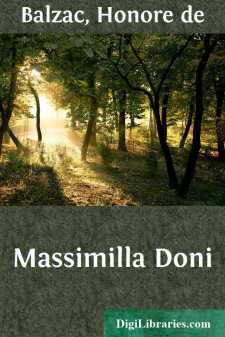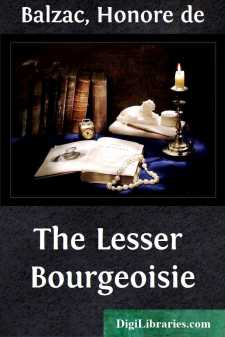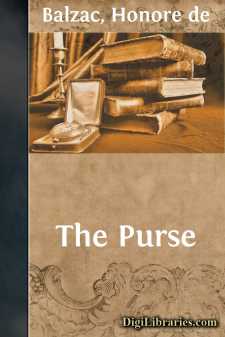Literary Collections
- American 84
- Ancient, Classical & Medieval 14
- Asian 1
- Australian & Oceanian 1
- Canadian 55
- Continental European
- English, Irish, Scottish, Welsh 179
- Essays 160
- General 24
- Letters 46
- Middle Eastern 1
Continental European Books
Sort by:
by:
Honore de Balzac
LOUIS LAMBERT Louis Lambert was born at Montoire, a little town in the Vendomois, where his father owned a tannery of no great magnitude, and intended that his son should succeed him; but his precocious bent for study modified the paternal decision. For, indeed, the tanner and his wife adored Louis, their only child, and never contradicted him in anything. At the age of five Louis had begun by reading...
more...
CHAPTER I—M. MYRIEL In 1815, M. Charles-Francois-Bienvenu Myriel was Bishop of D—— He was an old man of about seventy-five years of age; he had occupied the see of D—— since 1806. Although this detail has no connection whatever with the real substance of what we are about to relate, it will not be superfluous, if merely for the sake of exactness in all points, to mention here the various...
more...
by:
Honore de Balzac
MASSIMILLA DONI As all who are learned in such matters know, the Venetian aristocracy is the first in Europe. Its Libro d'Oro dates from before the Crusades, from a time when Venice, a survivor of Imperial and Christian Rome which had flung itself into the waters to escape the Barbarians, was already powerful and illustrious, and the head of the political and commercial world. With a few rare...
more...
by:
Honore de Balzac
Z. MARCAS I never saw anybody, not even among the most remarkable men of the day, whose appearance was so striking as this man's; the study of his countenance at first gave me a feeling of great melancholy, and at last produced an almost painful impression. There was a certain harmony between the man and his name. The Z. preceding Marcas, which was seen on the addresses of his letters, and which...
more...
by:
Honore de Balzac
A SECOND HOME The Rue du Tourniquet-Saint-Jean, formerly one of the darkest and most tortuous of the streets about the Hotel de Ville, zigzagged round the little gardens of the Paris Prefecture, and ended at the Rue Martroi, exactly at the angle of an old wall now pulled down. Here stood the turnstile to which the street owed its name; it was not removed till 1823, when the Municipality built a...
more...
by:
Honore de Balzac
CHAPTER I. ONE OF MANY CHEVALIERS DE VALOIS Most persons have encountered, in certain provinces in France, a number of Chevaliers de Valois. One lived in Normandy, another at Bourges, a third (with whom we have here to do) flourished in Alencon, and doubtless the South possesses others. The number of the Valesian tribe is, however, of no consequence to the present tale. All these chevaliers, among whom...
more...
"After all," Count d'Avorsy said, stirring his tea with the slow movements of a prelate, "what truth was there in anything that was said at Court, almost without any restraint, and did the Empress, whose beauty has been ruined by some secret grief, who will no longer see anyone and who soothes her continual mental weariness by some journeys without an object and without a rest, in...
more...
by:
Honore de Balzac
CHAPTER I. DEPARTING PARIS The tourniquet Saint-Jean, the narrow passage entered through a turnstile, a description of which was said to be so wearisome in the study entitled "A Double Life" (Scenes from Private Life), that naive relic of old Paris, has at the present moment no existence except in our said typography. The building of the Hotel-de-Ville, such as we now see it, swept away a whole...
more...
by:
Honore de Balzac
THE PURSE For souls to whom effusiveness is easy there is a delicious hour that falls when it is not yet night, but is no longer day; the twilight gleam throws softened lights or tricksy reflections on every object, and favors a dreamy mood which vaguely weds itself to the play of light and shade. The silence which generally prevails at that time makes it particularly dear to artists, who grow...
more...
by:
Honore de Balzac
I. THE LORRAINS At the dawn of an October day in 1827 a young fellow about sixteen years of age, whose clothing proclaimed what modern phraseology so insolently calls a proletary, was standing in a small square of Lower Provins. At that early hour he could examine without being observed the various houses surrounding the open space, which was oblong in form. The mills along the river were already...
more...











